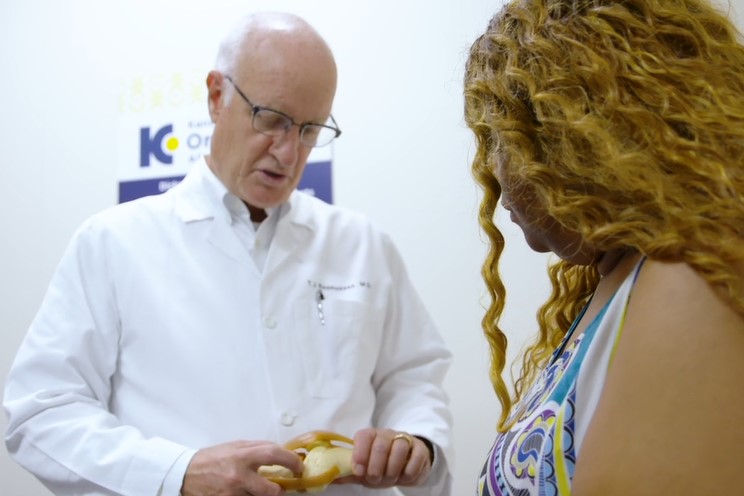
We continue our physician blog series with an informal Q&A with C. Lan Fotopoulos, M.D. Dr. Fotopoulos is a board-certified physical medicine and rehabilitation physician (also known as an interventional physiatrist) who has been with Dickson-Diveley Orthopaedics since 2004.
For those who don’t know, what is physical medicine and rehabilitation, and what is physiatry?
Physical medicine and rehabilitation, also known as interventional physiatry, is a type of medicine that combines many aspects of neurology, orthopedic surgery and rheumatology. Physiatrists are physical medicine and rehabilitation physicians who have advanced musculoskeletal training and specialize in treating and managing painful symptoms associated with a variety of orthopedic conditions. We treat these conditions using interventional (or non-surgical) procedures.
Tell our readers a little about your academic and professional background in medicine and physiatry.
After completing my medical degree from the University of Missouri–Kansas City School of Medicine and a surgical internship at Creighton University Medical Center, I completed two residencies at the University of Kansas Medical Center: one in anesthesiology and one in physical medicine and rehabilitation. My fellowship training was in musculoskeletal medicine at Washington University in St. Louis.
Today, I am certified by the American Board of Physical Medicine and Rehabilitation, the American Board of Pain Medicine, and the American Board of Family Practice – Sports Medicine. I am an Attending Physician at Kansas City Orthopaedic Institute, Saint Luke’s Health System and the University of Kansas Hospital. I am also a clinical assistant professor for the Department of Orthopaedics (Division of Physiatry) at the University of Missouri-Kansas City.
What are your subspecialized areas of expertise?
As an interventional physiatrist, I specialize in minimally invasive and interventional procedures for neck, back, hip, knee and shoulder conditions. Some of the most common procedures I perform are radiofrequency ablation, vertebroplasty, kyphoplasty, spinal cord stimulation, sacroplasty and epidural injections.
I also specialize in sports medicine. In fact, I have served as a Team Physician for a number of local sports teams, including the Kansas City Royals and Kansas City Explorers. I was also a Boxing and Mixed Martial Arts Physician for the State of Missouri.
How did you decide to become an interventional physiatrist?
My father was a surgeon and my mother was a nurse, so medicine has always been part of my life. Growing up, I saw the dedication my parents had for their patients, which ultimately inspired me to become a physician myself. As I grew older and learned more about biomechanics, that’s when I decided to pursue a career in interventional physiatry.
How did your experience in the U.S. Navy shape your career as an interventional physiatrist?
I served as a lieutenant commander and diving and undersea medical officer for the U.S. Navy. It taught me many valuable life lessons, such as the importance of ongoing precision training and the value of teamwork — things I apply to my work as an interventional physiatrist every day. Every member of the physician care team has valuable insight and experience to offer, and together, we find the solution that is best for each patient.
Tell us more about your approach to treating patients.
In addition to taking a multidisciplinary approach to patient care, I believe it is important to provide patients with the information they need to make informed decisions about their health. I encourage all my patients to be active participants in improving their bone, muscle and joint health — whether their care involves general lifestyle changes, orthopedic surgery or interventional treatment.
Do you treat workers’ compensation patients?
Yes. I have a great deal of experience treating and managing painful symptoms associated with work-related injuries. As an interventional physiatrist, I am often one of the early resources for case managers, adjusters and employers when determining if a patient had a pre-existing condition or experienced a work-related accident. Just like I do with other patients, I discuss all possible treatment options — including surgical and nonsurgical care — when treating workers’ compensation patients.
Do you coordinate care with other healthcare professionals — if so, who?
Yes. Depending on the diagnosis, I may refer patients to orthopedic surgeons if I feel orthopedic surgery is necessary. In addition to orthopedic surgeons, case managers and adjusters, I also refer patients to physical therapists when appropriate. As an interventional physiatrist, my primary goal is helping my patients get back to their daily activities as quickly and efficiently as possible through non-invasive treatment.
If you are a patient, referring physician, case manager or caregiver in need of more information about Dr. Fotopoulos or the interventional procedures he performs, please call 913-319-7600.
About Dickson-Diveley Orthopaedics
Since 1923, Dickson-Diveley Orthopaedics has provided high-quality orthopedic care. Our patient care team includes board-certified, fellowship-trained orthopedic surgeons and physiatrists, as well as physician assistants, nurse practitioners, durable medical equipment specialists and more. With two convenient locations in Leawood and Kansas City, Dickson-Diveley Orthopaedics offers surgical and non-surgical treatment options across all subspecialties of orthopedic medicine.


